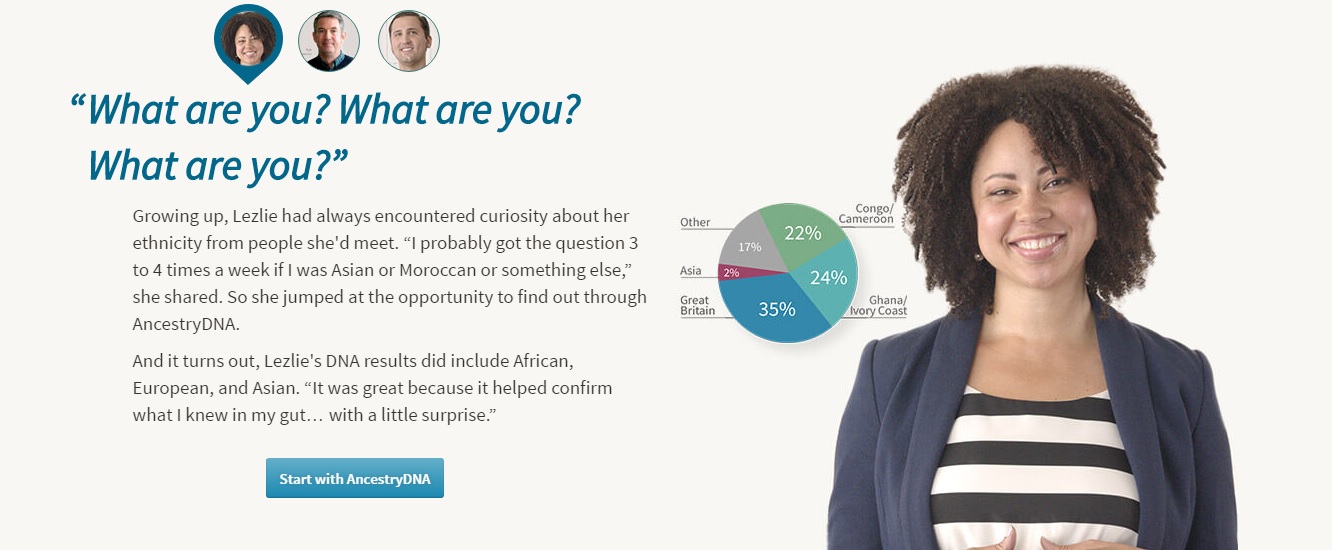
“Are you Indian?” “Are you French?” “Are you Filipina?” “Are you from the islands? You’re from the islands, right?” How many of you out there have come up against questions like these? I have, and it’s annoying. However, this aggravation is also the start of a journey that I have wanted to take for years. I’m getting the AncestryDNA test.
Why am I doing the test? Well, I’m tired of not knowing my history. More importantly, I’m tired of carrying around the baggage of being seen as an “exotic” object, something that’s affected me since childhood. I want to officially arm myself with the knowledge of my cultural heritage so I can feel a lot more confident in my own identity.
I’ve already talked about my personal difficulties coming to terms with identity, which you can hear on the No, Totally podcast. But just to be brief: I have often been made to feel like I’m in the middle of blackness and…something else. Dealing with that is tiring, especially when you don’t have knowledge of your own background apart from what your skin can tell you. In short, I’ve let other people control my identity; because I’ve practiced not being in total control of knowing my own identity, I’ve basically become a mystery to myself. That’s a problem, and it’s a problem I intend to fix.
Keep in mind: none of this is about escaping blackness. As I’ve said in my podcast episode, I love being black, and I strongly identify with my blackness. With that said, it would be nice to have some closure about my complete identity. Throughout my childhood, especially when I was wearing chemically relaxed hair, people would always assume I was something else other than a black girl from the south, which is what I have always been. However, I don’t want to have my identity decided for me by some random people who feel like I can’t be black just because I don’t look like how they think blackness should look. On the flip side, I don’t want to deny myself the opportunity to learn more about myself, including what’s in my bloodline. It’d be nice to be able to feel in control of my own identity, regardless of what that identity entails. I want to be able to celebrate all of me and defend all of me from persecution and ignorant “exotic” comments. If I have a varied ancestral background, I want to feel whole in that knowledge and honor all of those parts of myself. That’s what’s really at the root of this: this is a getting-to-know-me process on my own terms, not terms set by other people. I no longer want to carry shame for looking some way that others view as “acceptable blackness” or “exoticized blackness”. I want to be proud of myself and the group (or groups) I represent.
Regardless of that issue, though, I’ve often personally been curious about tracing my ancestry, and I feel a DNA test is the start of that, since I’ll know what ballpark I should be looking in for my ancestors. Tracing my ancestry has been a project that I’ve never fully had the time or money to engage in. I have always imagined myself to one day be like Alex Haley, having full knowledge of my lineage and the people who have shaped my history. I’ve always wanted to know how my experiences reflect those whose blood run through my veins. Knowing my personal history is something I’ve always felt needed to be done.
As a late birthday present to myself, I decided it was time to take the first step towards tracking my ancestry and ordered the AncestryDNA kit. The kit itself is simple; according to the instructions, you just provide a saliva sample and send it back. In six to eight weeks, you are sent an email linking you to your results page. Also, it’s $99, which is far cheaper than my first choice 23andMe. It also doesn’t check for stuff you don’t want, unlike 23andMe, which provides you with information on what health factors and health risks you could have. That information is useful in another setting, but it’s not particularly useful to me, who just wants to know what ethnic makeup is in my DNA.
The thing that sold me on AncestryDNA was this testimony from their site:
Look, this is not a sponsored article for AncestryDNA, so I have full rights to say that I don’t know if this woman is a real case study and if her testimony wasn’t just something made up by Ancestry’s PR to attract people like me, who are tired of being told they look like “something.” But regardless, it worked. I saw myself in that woman, and thought to myself that if she could find some answers, I sure could too.
For now, this post will act as the first in a series of posts about my identity journey. We’ll see what I find together! If you’ve been thinking about taking the AncestryDNA test or some other heritage DNA test, discuss in the comments section. If you’ve felt like you’ve been labeled “exotic” by others and are sick of that title, talk about that too. I’d like to read what you have to say about your own experiences with identity, identity questions, etc.